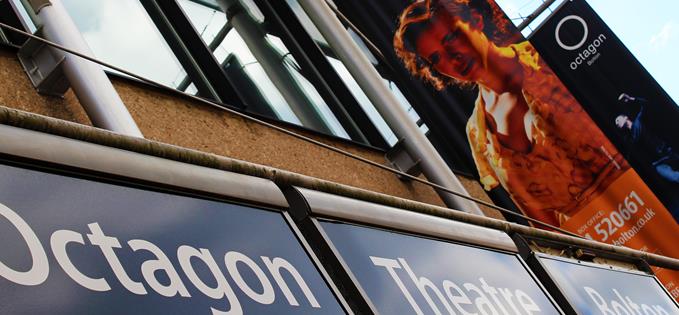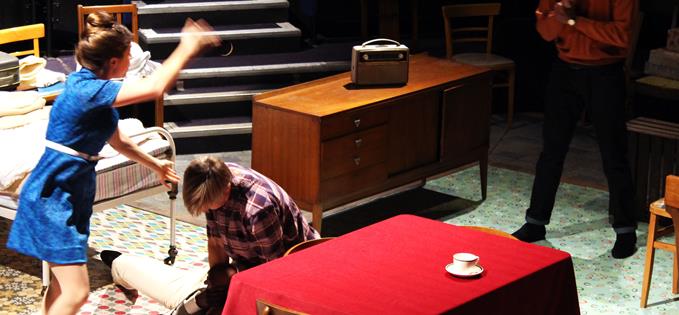IT WAS conceived as the unlikely idea of five ambitious drama students, who ultimately persuaded their lecturer to become its figurehead. Despite the fertile cultural climate of the mid-1960s, to build Britain’s first fully-flexible theatre (whose octagonal design means you're never further than nine metres from the stage) in a northern industrial town was extremely optimistic. Yet Robin Pemberton-Billing’s passionate advocacy saw dreams become reality: after a potholed journey of sticky red tape, funding fiascos and life-changing risks, the Octagon was built just eighteen months later; seven months after its foundation stone was laid.
There really is nowhere that permeates society quite like it
The theatre’s opening by HRH Princess Margaret in 1967 was threatened by a bomb scare (which turned out to be a brick) and, in 1999, it faced closure due to crippling financial deficit. Were it not for the burning desire to gift Boltonians with a true community theatre and a talented string of artistic visionaries to champion it, the Octagon - a registered charity - wouldn’t be here today.
Now nearing its 50th anniversary, the theatre draws in over 150,000 visitors annually and possesses an unrivalled dedication to both plays and people cementing its position as one of Bolton’s foremost attractions.
 The Octagon
The OctagonEncompassing everything from great European and American dramas to fresh new works embedded in North West culture, the Octagon’s programme melds classics with innovative new writing (over the past four seasons the theatre has produced six new plays).
A roster of regular patrons, history of working with renowned playwrights like Bill Naughton and archive material dating back almost half a century are suggestive of its first class productions, but there are also subtler indications: the attention to finer details (which even boils down to what day a particular 1960s newspaper was published and the stories it carried), the calibre of both actors and staff (multitalented, experienced and close-knit) and the fact that as much as possible is produced onsite, such as sets and costumes (many of which are stored and creatively repurposed), or else sourced locally.
Not many theatres can say that.
Artistic Director Elizabeth Newman believes that “the Octagon’s strength has always been commissioning plays the audience care about. Is it important? Will it add value to people’s lives? Even change lives? If not, we won’t take it on”.
Built with the aid of ‘buy a brick’ and ‘buy a seat’ community campaigns, the theatre’s very roots are in its relationship with local people, something that has remained integral: Robin Pemberton-Billing’s vision of “another local amenity, open to all, and not some sacred cultural haven for the edification of the middle-class elite” has endured, breaking barriers with all-day opening and a host of initiatives targeting 3000-5000 people annually. Adolescent or adult, aging or aged; and particularly for those who may experience social exclusion; there is an enriching programme for everyone, with some even inspired enough to set up their own groups (like women’s collective Melodramatics, whose members met through a theatre scheme for those in social housing).
 The Family Way Rehearsals
The Family Way RehearsalsWith educational projects prising the next generation from their TV screens, and future plans expanding yet further to ‘online and outside’, there's perhaps no cultural institution in Greater Manchester that permeates society quite like it. Other unique concepts include audience-actor discussions, regular studio events and a new theatre degree in partnership with Bolton University, to be headed by former Artistic Director David Thacker.
Thacker is succeeded by 29-year-old Elizabeth Newman, whose relative youth has raised a few eyebrows. Yet, as a graduate of the Regional Theatre Young Director Scheme with two directorships already under her belt, Newman’s wealth of experience rivals that of many older peers, while her enthusiasm is contagious. Having joined the Octagon in 2009, she has already stunned audiences with award-winning productions like Alice in Wonderland and Separation and continues to bring the sixties breezeblock building (due to be revamped in 2017) to life with compelling drama, collaborations and a creative approach that appeals to both young and old. The upcoming season includes Henrik Ibsen's An Enemy Of The People followed by Roald Dahl's BFG.
“The Octagon has benefited from the very best,” she says, “and I feel it’s now my responsibility to continue making an impact that’s inspiring, indelible and inclusive”.
Whilst it may indeed be making an impact in Bolton (in recent years voted one of the UK’s friendliest towns), the Octagon’s prominence ten miles away in Manchester is arguably less than it should be. Unawareness, laziness, even snobbery, are just some of the reasons many theatre-goers won't stray beyond city centre boundaries.
Yet, whilst Manchester may boast several high-profile theatres, small but prolific community institutions like the Octagon are few and far between; they're also at risk. In times of austerity, arts spending is often the first to go so it's up to us to make sure, alongside the likes of HOME and The Royal Exchange, that the region's lesser-acknowledged cultural gems endure.
So dig out your train timetables, plan a trip to the provinces and get your senses ringing with some world class theatre: made in Bolton.
Octagon Theatre, Howell Croft South, Bolton, BL1 1SB. 01204 529407.
Season runs September to July. For more information visit octagonbolton.co.uk











